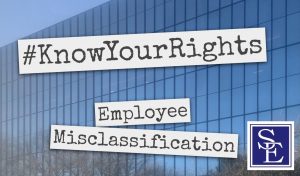Governor Phil Murphy has signed into law several bills that will significantly expand protections for New Jersey workers. The new legislation includes a package of bills that aim to protect the rights of workers who have been misclassified as independent contractors. The new law provides for penalties against employers who misclassify their workers as independent contractors instead of employees.
 The punitive aspect of the new law aims to encourage employers to appropriately designate employees as such, and therefore affording them the legal protections provided to employees under various state and federal employment laws. However, this controversial bill has sparked much debate regarding the future of workers in the “gig” economy. Opponents of the law contend that the new law will create significant financial burdens on businesses who will then in turn refuse to employ these workers.
The punitive aspect of the new law aims to encourage employers to appropriately designate employees as such, and therefore affording them the legal protections provided to employees under various state and federal employment laws. However, this controversial bill has sparked much debate regarding the future of workers in the “gig” economy. Opponents of the law contend that the new law will create significant financial burdens on businesses who will then in turn refuse to employ these workers.
New Jersey employment law distinguishes between two types of workers: employees and independent contractors. While regular employees enjoy and have access to wage theft protections, overtime pay, workers’ compensation, unemployment benefits, sick and family leave, health and safety, and anti-discrimination protections, independent contractors receive no such benefits. Historically, employers were required by law to pay tax contributions on employee’s wages only, and not those of independent contractors. This resulted in a scenario where it is enticing for employers to classify, and perhaps even misclassify, workers as independent contractors under any circumstance. The new legislation aims to combat such conduct and improve protections for misclassified workers.
The tests New Jersey uses to determine the classification of an employee largely center around the control an employer exercises on an employee and their work. The more control an employer has over a worker, the more likely the worker is properly classified as an employee. Independent contractors, at the other end of the spectrum, are not within the employer’s control and experience much more freedom to perform the services or work contracted for. As a result, independent contractors can often set their own hours and exercise discretion in the performance of their duties. Some workers prefer and even seek out the flexibility that accompanies the independent contractor classification.
New Jersey’s test to analyze classification is commonly known as the “ABC Test”. To demonstrate that a worker is in fact truly an independent contractor, the employer must establish each of the following elements:
- The individual has been and will continue to be free from the employer’s control or direction;
- The service is either outside the employer’s usual course of business of the employer or that such service is performed outside of any of the employer’s places of business; and
- The individual is customarily engaged in an independently established trade, occupation, profession or business.
To lay the groundwork for the new legislation, back in May 2018, Governor Murphy signed an Executive Order establishing the Task Force on Employee Misclassification. The Task Force investigated workers and employers in New Jersey and ultimately released a report in July 2019, which included 16 recommended courses of action to be taken via legislation and executive orders. With the passage of the bill package earlier this week, the first set of laws resulting from the Task Force’s work will take hold.
Bill A5839 seeks to punish employers who take advantage of the classification system in an attempt to avoid paying tax contributions on employee’s wages. The recent Task Force on Employee Misclassification investigation estimated that between 10 and 30 percent of employers have misclassified employees, a rising statistic, that costs the state millions of dollars annually in forgone income taxes. With the new law in place, employers found to be misclassifying workers may bear penalties including: a fine of “administrative misclassification penalty” of up to $250 for each misclassified employee; up to $1,000 each for subsequent violations; and up to 5% of the employee’s earned wages in the last year, to be paid to the employee. Under this new law, workers are also protected from retaliation by their employers for voicing inquiries or complaints regarding their classification.
Along with Bill 5839, Governor Murphy also signed into law two other bills concerning the misclassification of workers. Bill 5843 requires employers to post a conspicuous notice of misclassification laws and worker’s rights thereunder. Employers must provide notice of:
- the prohibition of misclassifying employees;
- the standard to determine a worker’s classification;
- the benefits and protections afforded to employees;
- the remedies available to misclassified employees; and
- how workers may contact representatives of the State to file a complaint or get information respecting misclassification.
An additional layer to the package of new legislation includes the State’s power to issue a stop-work order, halting all business operations at any of an employer’s locations where a violation of state wage, benefit or tax law is taking place. A final tool to crack down on misclassification of workers includes the permission for the Department of Labor and New Jersey State Treasury to share tax data information to identify misclassifications.
 New Jersey Employment Lawyers Blog
New Jersey Employment Lawyers Blog

